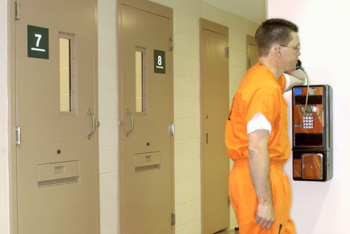 June 20, 2013 – A prison inmate whose phone scam defrauded AT&T out of $28,000 recently lost his appeal to the Wisconsin Supreme Court.
June 20, 2013 – A prison inmate whose phone scam defrauded AT&T out of $28,000 recently lost his appeal to the Wisconsin Supreme Court.
Matthew Steffes enlisted the help of his prison cellmate, as well and friends and family outside the prison, to set up phone numbers with stolen personal information and fictitious business names. Then, he made collect calls to those numbers knowing the accounts would never be paid, and the call recipients received free service.
While an inmate at Waupun prison, Steffes made 322 calls totaling 6,562 minutes (109 hours) using 60 fraudulent phone numbers created through AT&T. When AT&T shut down one account for unpaid bills, another was created, and so on. Ultimately, he was convicted on two counts of conspiracy to commit theft-by-fraud of more than $10,000.
He was sentenced to two years in prison and all members of the conspiracy were jointly and severally liable for restitution of more than $28,000. An appeals court affirmed.
In State v. Steffes, 2013 WI 53 (June 20, 2013), a Wisconsin Supreme Court majority (5-2) rejected Steffes’ arguments and upheld his conviction.
Steffes argued that under Wisconsin’s theft-by-fraud statute, a “false representation” requires a promise to perform, and he never promised AT&T that he would pay. Steffes also argued that he could not be guilty under the statute because the evidence proved he stole services, not property, and a party is not guilty unless property is stolen.
The majority explained that Wis. Stat. section 943.20 covers promises made with no intention of performing, but other conduct also “falls under the umbrella” of “false representation.” That is, a promise to perform is not required to commit theft-by-fraud.
“The scope and history of the theft-by-fraud statute make plain that providing fictitious business names and stolen personal identifying information to a phone company as a way of avoiding payment falls within the meaning of ‘false representation,” Justice Michael Gableman wrote.
The majority also noted that section 943.20 specifically includes “electricity” as protected property, and Steffes conspired to steal electricity. “When consumers make phone calls, AT&T must buy more electricity. The conspiracy perpetuated against AT&T therefore deprived the company of its property,” Justice Gableman wrote.
Chief Justice Shirley Abrahamson wrote a dissenting opinion, joined by Justice Ann Walsh Bradley. The dissenters argued that Steffes conspired to steal telephone services, and services “are not included within the statutory definition of property.”
“Even if stealing the telephone services can be shoehorned into the statutory concept of stealing electricity, I do not agree with the majority that, as a matter of law or fact, the value of electricity stolen is the same as the market value or replacement value of the telephone services stolen,” the chief justice wrote.
The fair market value of the telephone calls and service charges is different than the fair market value of electricity, the dissent argued, and the state did not prove the value of the electricity that Steffes stole despite an engineer’s testimony that it was possible.
“Testimony at trial was that the telephone service fees paid by consumers not only pay for the electricity used to power the system, but also pay for the transmission wires, cables, offices, employees, and other machines and equipment,” she noted.
